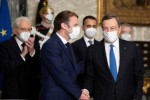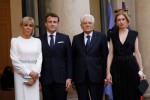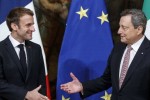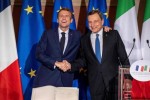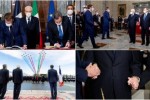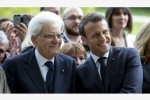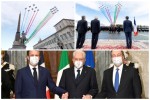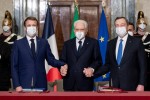ARCHIVE ACTIVITY
|
26 November 2021
Iniziative (EN) -
Federazione Anna Lindh Italia - Onlus (EN)
 Italian Prime Minister Mario Draghi and French President Emmanuel Macron signed the "Treaty for Enhanced Bilateral Cooperation" at the Quirinale, in the presence of the President of the Republic, Sergio Mattarella, and the Italian and French delegations. At the end of the ceremony, President Draghi and President Macron made joint statements to the press at Villa Madama.
Italian Prime Minister Mario Draghi and French President Emmanuel Macron signed the "Treaty for Enhanced Bilateral Cooperation" at the Quirinale, in the presence of the President of the Republic, Sergio Mattarella, and the Italian and French delegations. At the end of the ceremony, President Draghi and President Macron made joint statements to the press at Villa Madama.
President Michele Capasso stressed that this treaty is a first significant step towards the United States of the World. Responding to journalists, he said:
"Usually diplomats deal with treaties and they are often drafted as if they were a photocopy of each other. The Italy-France treaty, on the other hand, should be known because it is peculiar, it goes beyond the interests of diplomacy and concerns everyone. In essence, it involves the general interest of the two Countries and, in general, of Europe. Country. The "Treaty of the Quirinale" may affect the history of relations between Italy and France and the very future of Europe. Italy and France, two countries so close but often so far apart. This "Treaty" takes the path of integration in the most important sectors of a country's life: from security to technological innovation, from justice to the economy, from education to social and sustainable development, even in the extremely delicate sector of agriculture, in which Italy and France have often been in competition. But the added value is that this treaty is not closed, i.e. 'bilateral', as we say in diplomatic jargon. Instead, it is open to Europe and aims, mind you, not at defending the current intergovernmental, i.e. federal, structure, but at building a Europe that is finally federal, the one that young people dream of, the one we need, the one that the dramatic challenges of globalisation in the time of the pandemic require of us: the "United States of Europe" and the "United States of the World".
- THE QUIRINAL TREATY
- VIDEO 1 - 2 - 3
- DRAGHI DECLARATION
- THE PRESS 1 - 2
- MEDNEWS



